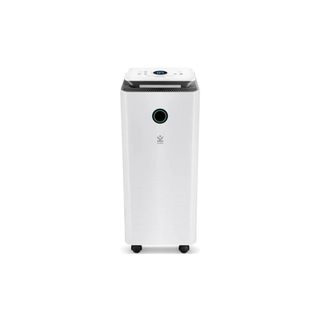Why do my windows have condensation on the inside? Experts reveal all – to help resolve the issue
If you're wondering why your windows have condensation on the inside each morning, our team of glass experts have all the answers you need
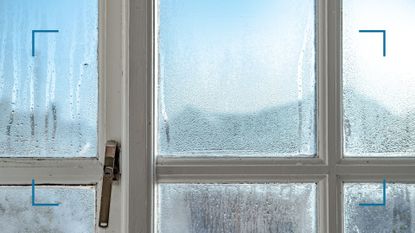

If you’ve woken up to be met with dripping windows more often than not you’re probably a little confused as to what’s causing it. I certainly am fed up with seeing my windows steamed up, so I put it to glass experts to find out how to stop it from happening.
No matter what windows you have condensation can be a thoroughly frustrating problem to deal with every day, especially when it comes to the wintertime. Of course, investing in one of the best dehumidifiers can help but what does it mean when that’s not enough?
There are only so many times I can ferociously wipe down the windows and remove the excess moisture without wondering why on earth it keeps showing up. So with that motivation, I spoke with glass experts to finally get some answers and figure out how to prevent condensation on windows for good.
Why do my windows have condensation on the inside?
If your windows are anything like mine then you’ll also be greeted each morning with a layer of condensation on the inside pane, it may differ in severity but you can certainly count on it being there each morning.
The source of the moisture can be rather puzzling, but it turns out there are a few reasons this may be appearing. We consulted glass experts to offer some insight into what's causing the condensation.
1. High humidity
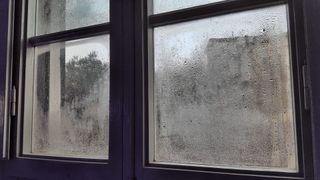
Humidity can be a real problem for our homes during winter and is one of the main reasons why you should buy a dehumidifier especially when the seasons change.
"An excess amount of moisture in the air increases the chance of condensation when indoor humidity levels are too high," explains Allan Reid, glass expert at ArtWindows&Doors.
Sign up for the woman&home newsletter
Sign up to our free daily email for the latest royal and entertainment news, interesting opinion, expert advice on styling and beauty trends, and no-nonsense guides to the health and wellness questions you want answered.
There are many ways you can reduce humidity in a house, and keeping the moisture down in our homes will not only help with that pesky condensation but also ensure all our soft furnishings and walls are kept dry and mould-free.
If you're looking to invest in a dehumidifier to keep condensation at bay then we've put together our top three, including some of the best dehumidifiers for a bathroom and the best dehumidifiers for a bedroom.
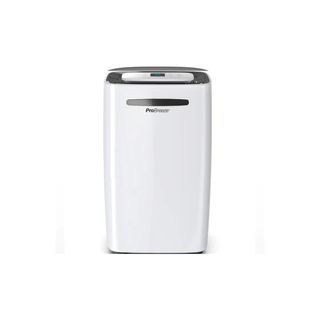
RRP: £199.99 | This Pro Breeze model can hold a large capacity of 5.5L of water, removing 20L per day, which will leave your room moisture-free. Read our full ProBreeze 20L Dehumidifier review to see more.
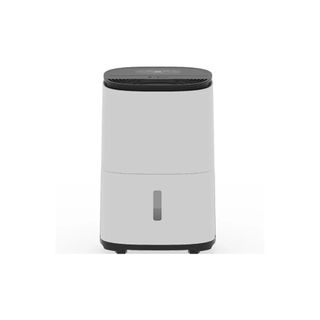
RRP: £190 | The MeacoDry Arete One is an all-around great dehumidifier. It's simple, easy to use, and even has a laundry mode. Read our full MeacoDry Arete One review.

Not only is Allan a home and glass expert, he is also the founder of Art, Windows & Doors which is a trusted supplier of double and triple-glazed windows. His company is comprised of industry experts and a qualified team of joiners all of whom pride themselves on excellent customer service and top quality products.
Don't forget to also consider how much it costs to run a dehumidifier if you are budgeting for the winter ahead. You might also wish to check out the latest Black Friday dehumidifier deals to save money when initially investing.
2. Difference between indoor and outdoor temperatures

You may have noticed that the condensation has gotten worse as the weather gets colder and despite all your efforts to keep your homes warm and free from damp, the moisture is still appearing on your windows.
“During the colder months when warm indoor air gets in contact with the cold glass of the windows, condensation begins to form,” explains John Cutts, a glass expert from MeandMyGlass. “This will usually occur more in rooms that have increased moisture, such as bathrooms and kitchens.”
If you can touch the moisture on the inside of your window then it’s more than likely because of the difference in temperature from your warm cosy home to the freezing outdoors.
John founded the Nottingham-based bespoke glass business Me and My Glass in 2022 after years of working as a glass specialist. The business offers customisable glass for both homes and businesses, with mirrors, shower doors and splash backs being available.
3. Insufficient Ventilation
Although opening our windows can be the last thing we want to do during the colder seasons, not allowing our homes to ventilate properly can be a huge issue for condensation build-up.
According to Allan, the lack of ventilation can cause damp air to be trapped which can lead to an accumulation of condensation on the windows in each room.
The easiest way to fix this is to open your windows each day, Allan recommends doing this in the morning to ensure your rooms have a good airflow. Failing that, you could always pick up some house plants that can help with condensation in any room.
4. Single pane windows
Unfortunately, those of us with single-pane windows are automatically more at risk of a condensation problem. So if like me, you have single-pane sash windows then you may find yourself dealing with condensation daily.
"Single-pane windows are less insulated and are more likely to allow condensation compared to double or triple-pane windows, which offer better insulation," explains Allan.
So whilst it is much better to have double or triple-glazed windows, a house-wide update isn't always an option so utilising how a dehumidifier works and other condensation hacks can help the problem without breaking the bank.
FAQ
Why do my windows have condensation between the panes?
As has been mentioned previously, condensation on the inside of your windows is completely normal and can be down to several different but manageable reasons. However, if you've noticed that the condensation is actually between your double or triple-glazed window panes and you cannot access the moisture then it may be a sign of something a little worse.
Condensation between the panes could be a sign of blown windows says John. "Moisture between double-glazed windows indicates that the seal has failed and air can pass through the glass panes," he explains. When the seal is no longer in tact, any temperature difference between the panes will make the window foggy with condensation.

Should new windows have condensation?
If you've recently taken the plunge and had new windows fitted in your house you might've thought you were in the clear when it comes to condensation. However, it turns out that no matter how new a window is it can still accumulate moisture.
"It might be worrying to see condensation on new windows, but in fact, this is a sign that the windows are working properly," explains John. "Newer windows will be much more efficient than older ones so it’s likely that condensation will occur each wintertime."
Should you still be a little worried about the condensation affecting your new windows then John recommends opening them regularly for good ventilation as well as wiping off the excess moisture when it appears.
In a bid to keep on top of my condensation problem, I asked for some expert-recommended tips from John and Allan for preventing window moisture as much as possible and here's what they said.
- Seal gaps and cracks: This step is very important for those of us who have single-pane windows as there's little to no backup protection from a second or third pane. Allen recommends inspecting your windows for any possible gaps or drafts as it's important to seal them to reduce temperature differences which will stop the condensation from occurring.
- Use window insulation film: Should your windows be particularly bad with both condensation and heat loss, Allan recommends applying some insulating film to your windows. This will significantly reduce the heat transfer and condensation on your windows.
- Upgrade your windows: Now this step is of course not a casual easy fix and can cost you a significant amount of money upfront, however, if you're in a place where your windows are way past saving then it might be a good idea to invest. Replacing your older windows with either double or triple-pane ones will increase your home's insulation and keep more warmth in, also saving you some money on your heating bills. As mentioned previously, condensation will still occur but it will be a little less likely.
It's best to stay on top of your condensation, but not all of us have the time or spare cash to replace our windows or invest in a dehumidifier. If this is the case then John says staying on top of the moisture with paper towels will still prevent dampness from forming on the walls.
Because cleaning windows is far easier than cleaning walls covered with mould. Just make sure to do it first thing in the morning when most of the condensation appears.
It's best to stay on top of your condensation, but not all of us have the time or spare cash to replace our windows or invest in a dehumidifier. If this is the case then John says staying on top of the moisture with paper towels will still prevent dampness from forming on the walls.
Because cleaning windows is far easier than cleaning walls, especially walls with mould. Just make sure to do it first thing in the morning when most of the condensation appears.

Emily joined woman&home as a staff writer after finishing her MA in Magazine Journalism from City University in 2023. After writing various health and news content, she now specialises in lifestyle and home writing where she covers all things cleaning, interiors and homeowning.
-
 Drew Barrymore says she ‘struggled so much’ mentally with perimenopause, revealing her unexpected symptoms
Drew Barrymore says she ‘struggled so much’ mentally with perimenopause, revealing her unexpected symptomsDrew Barrymore has opened up about the mental toll perimenopause has taken on her, explaining the barrage of symptoms she's been hit with since entering this phase.
By Lucy Wigley Published
-
 Amanda Holden took December style to the cosiest level in Zara ankle boots, her Fair Isle hat and scarf and fluffy plum coat
Amanda Holden took December style to the cosiest level in Zara ankle boots, her Fair Isle hat and scarf and fluffy plum coatUntil we saw Amanda Holden wearing a plum Holland Cooper coat and Fair Isle scarf and hat, paired with Sosandar leggings and Zara boots, we didn't know our wardrobes needed every single item pronto.
By Lucy Wigley Published
-
 I tested the De'Longhi AriaDry dehumidifier and loved its style and all-round performance
I tested the De'Longhi AriaDry dehumidifier and loved its style and all-round performanceIt's a top pick if you want a quiet, powerful and stylish machine that's exceptional at drying laundry
By Amy Cutmore Published
-
 I put the EcoAir DC12 MK3 dehumidifier to the test – and found it's perfect for bedrooms
I put the EcoAir DC12 MK3 dehumidifier to the test – and found it's perfect for bedroomsThis quiet dehumidifier punches above its weight when it comes to performance and usability, and won't break the bank.
By Amy Cutmore Published
-
 I tried the MeacoDry ABC 12L dehumidifier – its laundry drying is second to none, but it is noisy
I tried the MeacoDry ABC 12L dehumidifier – its laundry drying is second to none, but it is noisyThere's so much to love about this Meaco dehumidifier, but the pros and cons depend on your needs
By Amy Cutmore Published
-
 The new 'Kitschen' trend is taking over 'as people look to elevate retro style' reports a Pinterest expert
The new 'Kitschen' trend is taking over 'as people look to elevate retro style' reports a Pinterest expertStep aside minimalism, retro 'Kitschens' are the new interior trend on the block and it's all about the retro pastels
By Emily Smith Published
-
 5 costly kitchen cleaning mistakes you could be making every day
5 costly kitchen cleaning mistakes you could be making every dayExperts have revealed 5 common kitchen mistakes you probably make every day that could be causing major damage in the long run
By Emily Smith Published
-
 The five 'curious' bathroom sounds you should never ignore, warn experts
The five 'curious' bathroom sounds you should never ignore, warn expertsProfessional plumbing experts reveal the five alarming bathroom sounds you should never ignore
By Emily Smith Published
-
 Stanley Tucci's new cookware collection by GreenPan is the epitome of 'quiet luxury'
Stanley Tucci's new cookware collection by GreenPan is the epitome of 'quiet luxury'Beloved actor Stanley Tucci is now an established celebrity chef and his stunning cookware collaboration with GreenPan just proves how much he loves to cook
By Emily Smith Published
-
 The fragrant houseplants you need to make your house smell good at all times
The fragrant houseplants you need to make your house smell good at all timesIf you're looking to keep your home smelling its best then you might want to pick up some of these ultra-fragrant plants
By Emily Smith Published
